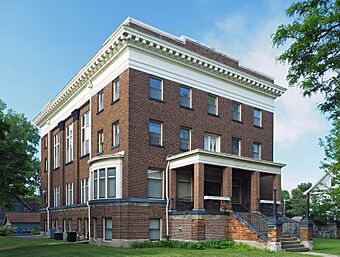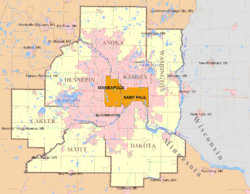Charles Thompson Memorial Hall facts for kids
Quick facts for kids |
|
|
Charles Thompson Memorial Hall
|
|

Charles Thompson Memorial Hall viewed from the northeast
|
|
| Location | 1824 Marshall Avenue, Saint Paul, Minnesota |
|---|---|
| Area | 0.46 acres (0.19 ha) |
| Built | 1916 |
| Architect | Olof Hanson |
| Architectural style | Neoclassical |
| NRHP reference No. | 11000949 |
| Added to NRHP | December 22, 2011 |
The Charles Thompson Memorial Hall is a special building in Saint Paul, Minnesota. It's a historic clubhouse for people who are Deaf. Built in 1916, it was the very first social club in the United States made just for Deaf people.
This hall was added to the National Register of Historic Places in 2011. This means it's an important historical site for its unique design and its role in social history. It's known for helping make Minnesota a welcoming place for Deaf people.
Contents
The Story Behind the Hall
How It All Started
The idea for Charles Thompson Memorial Hall began way back in 1896. This was at a meeting of the Minnesota Association of the Deaf. The meeting took place at the Minnesota Institute for Deaf, which is now called the Minnesota State Academy for the Deaf, in Faribault, Minnesota.
At this meeting, Charles Thompson met Margaret Brooks. Charles was the son of a rich banker from Saint Paul. Margaret's parents were immigrants from Scotland who lived in rural Minnesota. Charles and Margaret fell in love and soon got married. They made their home in Saint Paul. They also had a lake house in Alexandria, Minnesota.
A Place for Everyone
Charles and Margaret loved helping Deaf people connect. They used their homes in and around the Twin Cities to create busy places for Deaf and hard-of-hearing Minnesotans. People could meet, camp, or eat together. Their house in Alexandria, on Lake Darling, became so popular for Deaf campers that they even built permanent cabins there!
Building a Dream
Charles Thompson passed away in 1915. Margaret Thompson wanted to honor his memory. She used the money she inherited to build a special clubhouse for Minnesota's Deaf community. She hired Olof Hanson, a famous architect who was also Deaf.
In the early 1900s, it was hard for Deaf, deafblind, and hard-of-hearing people to find meeting places. Many buildings were not designed for them. So, Margaret's idea was very important.
In 1916, at the dedication ceremony, Margaret laid the cornerstone of the new building. About 500 people were there! She also announced that she was giving the building and a large amount of money (about $45,000 from 1916, which is like a lot more money today) to a group of trustees. This made sure the club would always be free for all Deaf people in Minnesota. It didn't matter what their religion or political beliefs were.
What's Inside the Hall?
The Charles Thompson Memorial Hall has many cool features. It has a big assembly hall, a bowling alley, and a social hall. There's also a maplewood dance floor and a play area for children.
The building was designed with large windows and high ceilings. This was to make sure there was lots of light. Good lighting helps people see American Sign Language (ASL) clearly and easily. Sometimes, new movies with closed captioning were shown on a curtain on the stage.
The Hall's History
A Hub for the Community
Since 1917, the Minnesota Association of the Deaf has often used the hall. They hold their big meetings there every two years. In 1957, the hall started its own newsletter, The Thompson Hall Newsletter. Later, in 2002, it became the Minnesota Deaf Newsletter.
This newsletter shared news about events at the hall. It also gave updates on the Minnesota State Academy for the Deaf in Faribault. News about local Deaf sports teams and the Minnesota Association of the Deaf was also included. It was a great way to share important news for the Deaf, deafblind, and hard-of-hearing community.
A Century of Service
The clubhouse has reached many important points in its history. It was added to the National Register of Historic Places in 2011. In 2016, members celebrated the hall's 100th birthday!
Sometimes, members have faced challenges. They work hard to keep the space in good condition and make sure it's open to everyone. They also try to get younger members involved. Even with these challenges, the Charles Thompson Memorial Hall is a strong symbol. It shows over a hundred years of hard work by Deaf, deafblind, and hard-of-hearing Minnesotans.
Gallery
See also
 | Stephanie Wilson |
 | Charles Bolden |
 | Ronald McNair |
 | Frederick D. Gregory |










